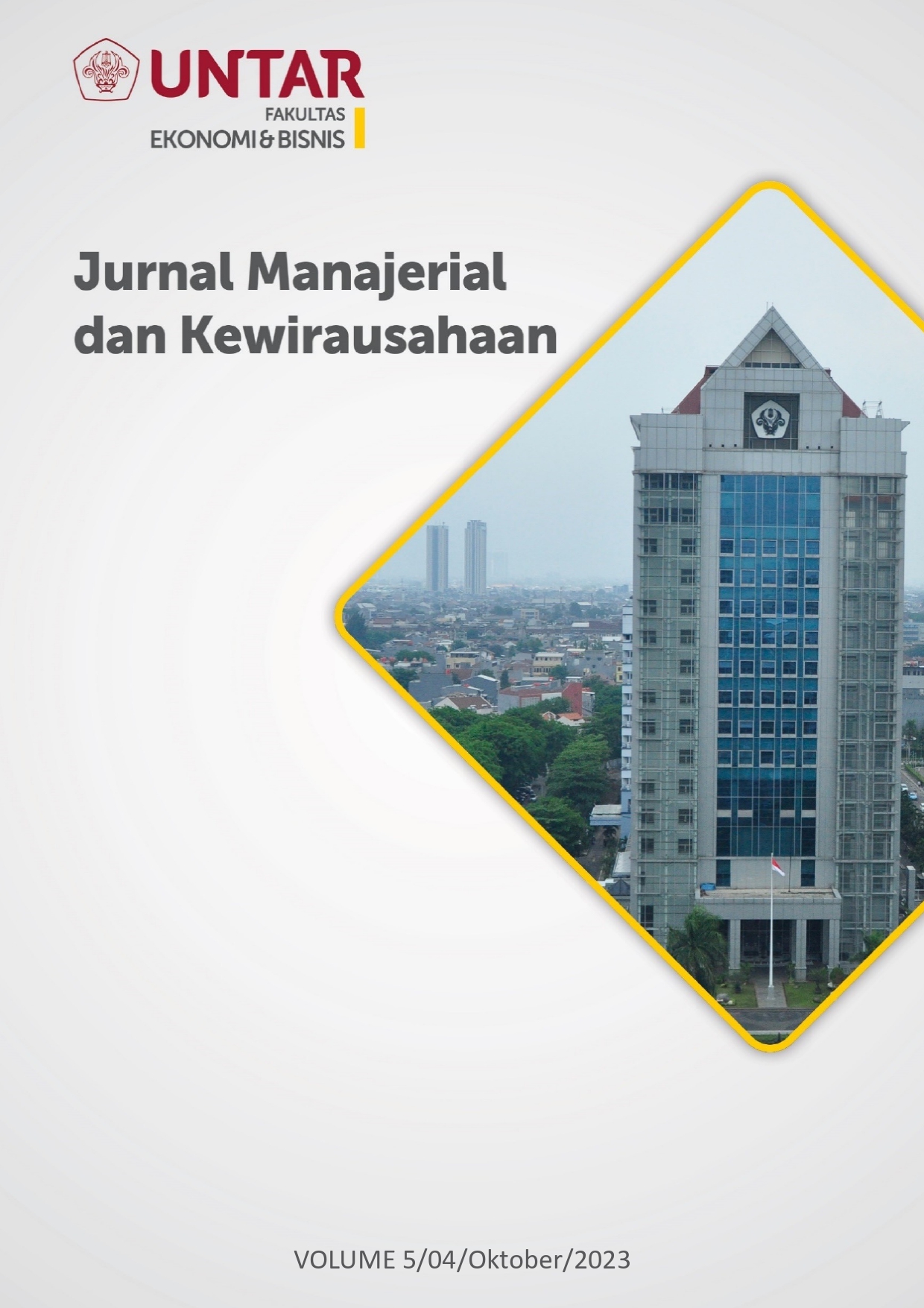Pengaruh Lingkungan, Orang Tua Panutan, Dukungan terhadap Minat Berwirausaha Mahasiswa Universitas Tarumanagara
Main Article Content
Abstract
Indonesia is not immune from unemployment problems. High unemployment rates will reduce the welfare and standard of living of the community. This condition is due to the fact that many workers who are ready to work do not have jobs due to the lack of entrepreneurs, resulting in an inability to meet their basic needs. The purpose of this study was to test empirically the influence of the institutional environment, parents, family support on interest in entrepreneurship. This study used a descriptive research design because no variables were manipulated. In descriptive research there is a cross-sectional design, which is a type of research design that collects data once during the research period. The population in this study is students of the Faculty of Economics and Business, University of Tarumanagara with a management study program, concentration in entrepreneurship. In this study, the sample was taken using non-probability sampling and by using a purposive sampling technique, the sample in this study was 130 samples. The results of this study indicate that the institutional environment, Role model parents and family support have a positive and significant effect on the interest in entrepreneurship for Tarumanagara university students.
Article Details
Section

This work is licensed under a Creative Commons Attribution-NonCommercial-ShareAlike 4.0 International License.
This work is licensed under a Jurnal Muara Ilmu Ekonomi dan Bisnis Creative Commons Attribution-ShareAlike 4.0 International License.,/p>
References
Abdillah, W. & Hartono, J. (2015). Partial Least Square (PLS): Alternatif Structural Equation Modeling (SEM) dalam Penelitian Bisnis. Yogyakarta: Andi Offset.
Ajzen, I. (1991). The Theory of Planned Behavior. Organizational Behavior and Human Decision Processes, 50: 179-211.
Alma, Buchari. (2017). Manajemen Pemasaran dan Pemasaran Jasa. Bandung: Alfabeta.
Badan Pusat Statistik. (2021). Perkembangan Jumlah Pengangguran di Indonesia.
Bhagchandani, R. (2017). How India can up its start-up game by bolstering student entrepreneurship.
Biraglia A, Kadile V. (2017). The Role of Entrepreneurial Passion and Creativity in Developing Entrepreneurial Intentions: Insights from American Homebrewers. Journal of Small Business Management. 55(1).
Bogatyreva, Linda F, Tatiana S, Oleksiy O. (2019). When do entrepreneurial intentions lead to actions? The role of national culture. Journal of Business Research 96(9):309-321.
Dubey, kailash. Examining the effects of demographic, social and environmental factors on entrepreneurial intention. Management Matter.19(1).
Esfandiar. (2019). Pemanfaatan Media Sosial dalam Pemasaran Produk UMKM di Kelurahan Sidokumpul, Kabupaten Gresik. Jurnal Ilmu Komunikasi. 10(1).
Fairlie, Robb. Families, Human Capital, and Small Business: Evidence from the Characteristics of Business Owners Survey. SSRN Electronic Journal 60(1296).
Ghozali. I, Latan. H. (2016). Partial Least Squares Konsep, Teknik dan Aplikasi Menggunakan Program SmartPLS 4.0 Edisi 2 Untuk Penelitian Empiris. Semarang: Badan Penerbit Universitas Diponegoro.
Hair, J. F., Black., W. C., Babin., B. J., Anderson., R. E., & L.Tatham., R. (2006). Multivariate Data Analysis 6th Edition. New Jersey: Pearson International Edition.
Henseler, J., Ringle, C. M., & Sinkovics, R. R. (2009). The Use of Partial Least Squares Path Modeling in International Marketing. Advances in International Marketing, 20, 277-319.
Linan, F & Rodriguez, J. C. (2017). Factor Affecting Entrepreneurial Intention Levels: a Role for Education 2011. International Entrepreneur Management Journal (2011) 7:195–218.
Lucky, Ibrahim. (2014). Relationship between Entrepreneurial Orientation, Entrepreneurial Skills, Environmental Factor and Entrepreneurial Intention among Nigerian Students in UUM. Entrepreneurship and Innovation Management Journal. 2(4).
Mahesa & Edy Rahardja. (2012). Analisis Faktor-Faktor Motivasi Yang. Mempengaruhi Minat Berwirausaha. 1(1), 130-137.
Malhotra. (2010). Riset Pemasaran Pendekatan Terapan. Jakarta: Gramedia.
McElwee, G. (2003). Women entrepreneurs in Oman: Some barriers to success. Career Development International 8(7):339-346.
Pasuria S. (2022). Pengaruh Angkatan Kerja, Pendiikan, Upah Minimum, dan Produk Domestik Bruto Terhadap Pengangguran Di Indonesia. Sibatik Journal. 1(6)795-807.
Permatasari. (2018). Analisis Relevansi Pendidikan Kewirausahaan dan Lingkungan Kampus Terhadap Minat Berwirausaha Mahasiswa Perguruan Tinggi di Jawa Barat, Indonesia. Jurnal Ilmu Sosial Politik dan Humaniora.1(2).
Prasetyo (2015) Pengaruh Sikap Kewirausahaan Terhadap Minat Berwirausaha Mahasiswa Manajemen Fakultas Ekonomi Dan Bisnis Universitas Muhammadiyah Malang. Other thesis, University of Muhammadiyah Malang. Institutional Repository.
Selamat, F., Tunjungsari, H. K., & Ie, M. (2014). Dasar-Dasar Kewirausahaan, Teori dan Praktek. Jakarta: Indeks.
Soelaiman, L., Selamat, F., & Puspitowati, I. (2023). Exploring the predictive factors of gen Z readiness for entrepreneurship. International Journal of Research in Business and Social Science, 12(5), 10-16. https://doi.org/10.20525/ijrbs.v12i5.2757

